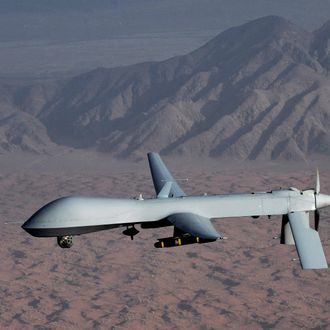
An “exclusive” NBC story on Wednesday reported that the CIA wasn’t always sure who it was killing with drones in Pakistan. It cited classified documents that showed one in four hit by drone strikes were classified as “other militants,” a catch-all term for people whose affiliation the agency couldn’t identify, suggesting they may be civilians. It’s a pretty significant claim, but it’s also not exactly new. A number of investigations over the past few years have come to the conclusion that U.S. officials were vastly underestimating how many civilian deaths drone strikes caused. And a McClatchy report from April apparently used the same documents to come to a similar conclusion. Now McClatchy would like NBC to give it some credit.
McClatchy broke down the data in the documents a bit differently from NBC, and it led with the angle that drone strikes were killing more than just Al Qaeda leaders, not that the CIA wasn’t aware of who it was killing. But one paragraph sounds remarkably similar to NBC’s lede:
The documents also show that drone operators weren’t always certain who they were killing despite the administration’s guarantees of the accuracy of the CIA’s targeting intelligence and its assertions that civilian casualties have been “exceedingly rare.”
After the NBC story dropped, the author McClatchy’s story, national security correspondent Jonathan Landay, called it a “bogus exclusive,” and tweeted that he’d used the same classified data in his story. McClatchy’s Washington bureau chief, James Asher, tweeted “shame” to NBC reporter Richard Engel, asking him to take the “exclusive” off the headline. Engel hasn’t responded publicly, and the “exclusive” label remains.
But despite disagreements over who was first to the story, it’s hard to see how more in-depth reporting on a program even the government thought was dangerously covert could possibly be a bad thing.





























